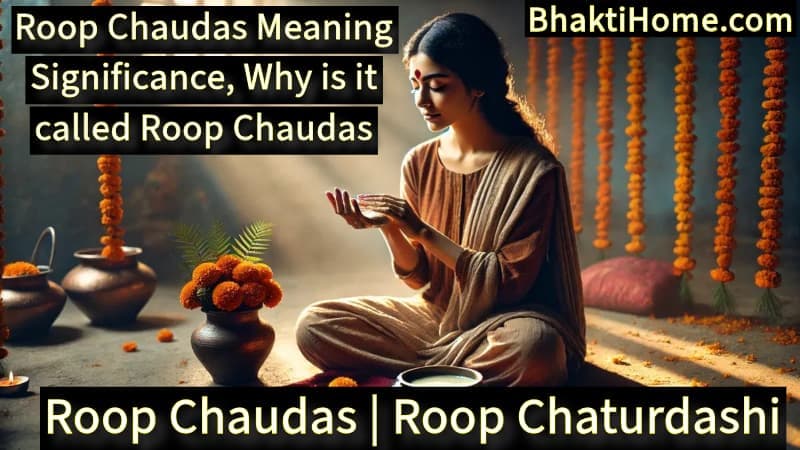
Roop Chaudas, also known as Roop Chaturdashi, is a significant festival celebrated in Hindu culture, marking the 14th day of the waning moon in the auspicious month of Kartik. Falling just before the grand celebrations of Diwali, this day is dedicated to honoring beauty and well-being, particularly among women.
Roop Chaudas | Roop Chaturdashi
Roop Chaudas signifies a time for rejuvenation, self-care, and purification, where individuals indulge in traditional beauty rituals that enhance their physical appearance while also preparing them spiritually for the upcoming festivities. This vibrant celebration not only emphasizes the importance of self-love but also fosters family bonding and cultural heritage, making it an integral part of the Diwali festivities.
Roop Chaudas: Meaning, Significance, and Celebration
Introduction to Roop Chaudas | Roop Chaturdashi
Roop Chaudas, also known as Roop Chaturdashi, is an important Hindu festival celebrated on the 14th day of the waning moon in the month of Kartik. This day falls just before the festival of Diwali and is dedicated to honoring the beauty and well-being of individuals, especially women. It is a day of cleansing, rejuvenation, and preparation for the grand Diwali festivities that follow.
Meaning of Roop Chaudas | Roop Chaturdashi
The term "Roop Chaudas" can be broken down into two parts: "Roop," which means beauty or form, and "Chaudas," which refers to the 14th day in the lunar calendar.
Thus, Roop Chaudas literally translates to "the 14th day of beauty." It signifies a day dedicated to enhancing one’s appearance and well-being.
Why is it Called Roop Chaudas?
Roop Chaudas is called so because it is traditionally a day for individuals, especially women, to adorn themselves and celebrate their beauty. On this day, women often perform special beauty rituals such as bathing with ubtan (a natural scrub made from various ingredients like turmeric, gram flour, and milk), applying henna, and dressing in fine clothes and jewelry. It is a day of self-care, self-love, and preparation for the upcoming festival of lights.
Significance of Roop Chaudas
- Celebration of Beauty: Roop Chaturdashi is primarily focused on the physical and spiritual beauty of individuals. It serves as a reminder to appreciate one's self and the importance of inner beauty that reflects outwardly.
- Preparation for Diwali: Roop Chaudas acts as a precursor to Diwali. It is a day to cleanse not just the body but also the mind and soul, ensuring that one enters the festival with positivity and purity.
- Cleansing Rituals: The rituals performed on Roop Chaturdashi often involve cleansing both physically and spiritually. Women apply ubtan, which not only enhances their complexion but is also believed to purify the body and mind.
- Social Bonding: It provides an opportunity for families and friends to come together to celebrate, share beauty tips, and enjoy each other's company before the grand festivities of Diwali.
- Cultural Heritage: Roop Chaudas preserves cultural traditions and rituals, connecting the younger generation to their roots and instilling the importance of rituals and celebrations in their lives.
Rituals and Practices of Roop Chaudas
- Ubtan Ceremony: Women apply a paste made from turmeric, sandalwood, and other natural ingredients on their skin. This is believed to purify the body and enhance beauty.
- Bathing and Dressing: After the ubtan, women take a ceremonial bath and wear new or festive clothes, often in bright colors, symbolizing joy and celebration.
- Prayers and Offerings: Many women pray to Goddess Lakshmi, seeking blessings for health, wealth, and beauty. Some also offer sweets and other delicacies to family members.
- Henna Application: Applying henna is a common practice on this day, symbolizing beauty and auspiciousness.
- Family Gatherings: Families often come together to celebrate and perform rituals collectively, strengthening family bonds and shared traditions.
Roop Chaudas story
In Hindu mythology, Roop Chaudas is associated with the goddess Parvati and the celebration of her beauty. According to one popular legend, it is believed that Goddess Parvati underwent rigorous penance to win the affection of Lord Shiva. After years of devotion and austerity, she finally succeeded, and they were married. Their union symbolizes the perfect balance of beauty and strength.
As the story goes, after their marriage, Parvati wanted to ensure that all women remained beautiful and healthy. To honor this wish, she decided to bless women with a day dedicated to self-care and beauty rituals. Thus, Roop Chaudas was established, becoming a day for women to enhance their appearance and prepare for the upcoming festival of Diwali, the festival of lights.
The Significance of Beauty on Roop Chaudas
On this day, women indulge in traditional beauty treatments, such as applying ubtan (a herbal paste) and henna, which signifies not only their outer beauty but also their inner purity and grace. Roop Chaudas is a time for self-reflection, celebrating femininity, and embracing the essence of womanhood.
Roop Chaudas connection to Narak Chaturdashi
Roop Chaudas is also linked to Narak Chaturdashi, the day before Diwali, when the demon Narakasura was defeated by Lord Krishna. This victory over evil signifies the triumph of light and goodness, making Roop Chaturdashi an important prelude to the festivities of Diwali.
On this day, women are believed to embody the spirit of Goddess Parvati, embracing beauty and positivity. It encourages not only physical cleansing but also spiritual renewal, setting the stage for the joyous celebrations of Diwali that follow.
Conclusion
Roop Chaudas, or Roop Chaturdashi, is much more than just a day for beauty treatments; it is a celebration of self-love, spirituality, and family.
As it precedes Diwali, it serves as a vital step in preparing oneself for the forthcoming festivities, both physically and mentally. Emphasizing the importance of tradition and self-care, Roop Chaudas encapsulates the essence of the vibrant culture and values that permeate Hindu festivities.
The story of Roop Chaturdashi beautifully intertwines themes of beauty, devotion, and celebration. It highlights the importance of honoring oneself and embracing femininity, making it a cherished part of the Diwali festivities. By celebrating Roop Chaudas, women not only pay homage to the goddess but also strengthen their bond with family and community, reinforcing cultural traditions that have been passed down through generations.

